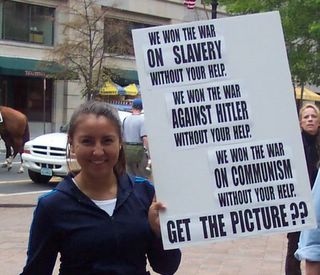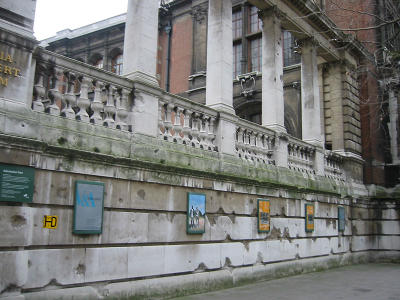This is the beginning of an attempt to give something back to a country to which I feel I owe my life, and to a culture of freedom with which I am deeply in love. It is my long overdue thank-you letter to America. It is the still-unfolding story — told from inside this wonderful, imperfect bubble of relative freedom, stability and prosperity that I feel so deeply grateful to inhabit — of my own American Dream.
That last in particular is a rather loaded phrase to use these days, I have come to learn, but I leave it there with a purpose. It's the tragically baggage-laden name given to one of many concepts I intend to touch on here. Give me time and I will explain what it means to me, and why I think it is worthy of more than our derision.
Part of my approach to this project, I expect, will be telling fragments of the one story that I know best: the story that I have lived and seen with my own eyes. So it seems appropriate to begin with one such fragment, one thread drawn from the many that have run through my life:
Music has always been precious to me. The music I've known in my life has become an inextricable part of the way I remember times and places gone by, and of the way I think about the future. “Fearless Dream” is a phrase taken, in a sense, from a song I grew up with. During a pivotal phase in my life, between my friends' departures for college and embarking on my own adventures — now, I dare admit, roughly 15 years ago — one of the albums I listened to most was Rush's “Exit ... Stage Left”. It was frequently there in the background as I dreamt my own dreams and hatched my own hopeful and ambitious plans for the future. The second song on the album, “Red Barchetta,” tells the story of a young man's weekend escapes to his uncle's farm, where he takes an old roadster for harrowing white-knuckle rides down winding country roads. Geddy Lee's infamous soprano voice soars exuberantly over Neil Peart's equally famous rock-steady syncopated drumming, as guitar and bass drive the rhythm line home in tight and agile unison:
“Jump to the ground
As the turbo slows to cross the borderline.
Run like the wind of excitement
chilling up and down my spine.
For down in his barn,
my uncle preserved for me an old machine
(old in your years).
To keep it as new has been his fearless dream.
I strip away the old debris, that hides the shining car
a brilliant, red Barchetta from a better-managed time”
Or at least, that's how I always heard it. The consensus among the lyrics websites seems to be that the actual phrase is “dearest dream.” Some of the other details differ from what I remember too. But the above has stuck in my mind as what my ears always heard, and seems fitting in its own right — so, for my purposes, “fearless dream” it will always be. When I listen to the song today, those ringing words still lift my spirits as much as ever.
The phrase struck me as an appropriate title for this web log for two reasons. First — and this is a broad theme on which I hope to elaborate here — because I think it takes courage to live in a truly free society. Freedom comes with no roadmap and no warranty. Trying to figure out what to do with it can be scary as hell. It has been, at times, for me. This is something that I think most of us are not taught to expect, at least not directly. Yet acknowledging the inherent risk that goes in hand with having real freedom, and addressing the question of why living in freedom might be worth embracing the accompanying uncertainty and peril, is essential I think, if we're to have some hope of preserving this precious and hard-won gift. We must keep the answer to this key question in mind as we consider possible courses of action that can curtail freedom, or we may give it up without much of a thought.
Second, I want to make some humbly offered contribution here to illuminating and thereby hopefully helping to revitalize and preserve the ideas that have made this culture of freedom possible — ideas that I think form the essential cornerstone of our culture's success. Ideas of great prescience and beauty that we seem, from my current perspective, to be in actual danger of either forgetting or intentionally discarding. “...this brilliant, red Barchetta from a better-managed time...”
I don't think of myself as someone who's given to worrying overly much. If anything, I more often tend to fall into the middle-of-the-road “Crisis? What crisis?” category. But certain of the seemingly popular attitudes that I have encountered repeatedly since my college years have left me with the sinking feeling that something has gone terribly, terribly wrong in our perception of ourselves and our way of life. We seem to be paying an inordinate amount of attention to the hand-wringing of professional social critics, while forgetting the very good reasons for choosing to live as we do. At times, I fear we might be getting ready to throw this precious gift, born of so much sacrifice, out the window. Certainly I know people, including old and dear friends, who seem to think that the time for the American way of life, with its emphasis on individual freedom and carefully circumscribed governance, has come and gone. That we ought to replace the maxim of “life, liberty, and the pursuit of happiness,” and the legal and governmental framework that supports it, with something ostensibly better. If that is to be the case, then I feel the need to say my peace before it is gone. Because if we turn our backs on this idea of freedom that has been so foundational to our way of life, I think we should at least take the time to fully understand what it is that we will be giving up.
Writing this weblog is part of my way of dealing with the heartbreak of this apparent change in attitudes, attempting to understand what has caused it, and trying to figure out whether it might be reversible. Freedom has made my life possible, and it has taken me some years to appreciate just how precious and fragile it is, and to realize just how much I have taken it for granted.
There are so many interrelated ideas that I want to explore here, that it's difficult to say at the outset what the overarching, unifying theme will be. This has to do with how we think about economics, equality, responsibility, rights, science, reason, technology, art, culture, human achievement, history, and the future ... that great unknown and unknowable. I can't possibly forsee, at the outset of this project, whether I will be able to clearly articulate the many interconnections among ideas that I'm setting out to explore ... or whether I will even succeed in making the time, amid a very busy work and home life, to keep up the project. But these are things I find myself thinking about all the time, and touch on issues that I've come to think are crucial to our future. This stuff has been lodged painfully in my heart and I just have to get it out. So I will try.
I of course have my own filter, my own lens through which I see the world, which may well differ from yours. I have great confidence in the “free market in ideas” -- in your capacity as the reader to survey the wide variety of ideas that are out there and then draw your own conclusions based on the sum of the evidence and arguments presented. Critics have every right to criticize, and we have the right to ask whether what they're saying really makes sense. My aim here is only to use my one voice to say things that I think need saying. There are well-reasoned arguments to be made in favor of choosing freedom over safety and other competing demands, and I hope to shed some light on those here, for it seems we don't get much exposure to them nowadays.
In no small part, I am here to make what, much to my surprise, has become a pretty bold and audacious statement in the year 2005: that we in the United States have been needlessly losing confidence in our way of life. That we have a culture that, while it needs a little help here and there, is every bit worthy of our hope, enthusiasm, adoration, sacrifice, courage, loyalty, and devotion.
This is the beginning of an attempt to give something back to a country to which I feel I owe my life, and to a culture of freedom with which I am deeply in love. It is my long overdue thank-you letter to America. It is the still-unfolding story of my own American Dream.
Stay tuned. The best, I hope and believe, is yet to come.












